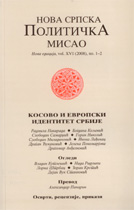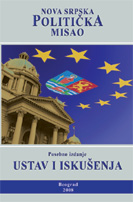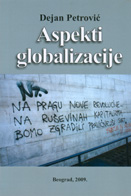| NSPM in English | |||
Time for an independent Serbia |
 |
 |
 |
| недеља, 17. фебруар 2008. | |
|
This independent Serbia can then put a final end to the Balkan wars of the 1990s, as it scoops up Radko Mladic and sends him to be dealt with by others rather than allowing him to hide behind the broad, but bent, shoulders of the Serbian people. This liberated and independent Serbia can then allow the ingenuity and skill of its people to build a prosperous and just society and become the region's most important democracy. Too bad it will not happen this way. Serbia's leadership rejects independence for Kosovo and thereby rejects independence for Serbia. And Serbia's radical right rejects even the country's rejectionist leadership. The Serbian people want nothing better than to achieve their real independence and thus victory over the past, but they are being told "real" Serbs don't want victory. "Real" Serbs want a good losing fight, followed by a spirited centuries-long discussion of what and who caused the loss. But without a credible Serbian champion for Serbian independence, the great people of this country are never served another diet other than the old, always failing, conventional wisdom of the Serbia's historical lot in life. So as a practical American, schooled in the ways of political opportunity, even at a certain risk, I have often asked myself why doesn't a smart Serbian leader boldly offer the people the independence they desire? During my years as our ambassador in Belgrade, I actually did ask this question directly and I consistently received the same answers from one side of Serbian society: (1) The people would rather give up the future of Serbia, to fight for a future of Kosovo inside Serbia; and (2) Any leader, no matter how popular, who would support or even accept the independence of Kosovo, would be committing political suicide. A similar, although steadily weakening, argument was made regarding the delivery of Radko Mladic. A number of analysts, domestic and international, are quite concerned over these assertions, along with the accompanying threat that Serbian independence from its past will threaten Serbian democracy and regional stability. I do not expect any of this to occur. Serbia actually started building its democracy after it lost in its Bosnia and Kosovo adventures, and became more productive as a nation after the end of its unhappy marriage to Montenegro. It will eventually be the best Serbia it can be after Kosovo independence and Mladic are behind it as well. I don't think the majority of the truly remarkable people of Serbia fear life after Kosovo, but heated politicians' rhetoric makes for a handy populist argument against "vicious, land-grabbing Americans, Europeans and that anti-Serb court in The Hague." We are now past the latest of several deadlines in the international community's quest for Serbian independence. On Dec. 10, 2007, the U.S.-European Union-Russian troika concluded its efforts to encourage a negotiated solution on Kosovo. There was none. On Feb. 3, a democratically minded and Europe-oriented candidate won re-election as president of Serbia. Regrettably, he too feels he must stick to the majority rhetoric on Kosovo of Serbia's political leadership. The only solution for Kosovo — and more importantly for Serbia — is well-known. Kosovo will be separated from Serbia without Belgrade's negotiated agreement, achieving a status independent from Belgrade. But Kosovo will not be even remotely independent of its responsibilities for building a just society for all of its people, as it must. Highly unlikely to achieve any Russian support, the United States and Europe must accompany both independence processes without Moscow. It will continue to be a thankless and expensive task. But the completion of Europe is serious business. We owe it to our Serbian and Albanian friends to allow no further continuances and to liberate them both, because they simply cannot do it for themselves. They deserve so much better than they are currently getting. Michael C. Polt is a career diplomat who most recently served as the U.S. ambassador to Serbia 2004-2007. He is currently a senior trans-Atlantic Fellow at the German Marshall Fund of the United States on temporary loan from the State Department. The views expressed in this article are his own and do not necessarily reflect those of the U.S. State Department or the United States government. http://www.washingtontimes.com/apps/pbcs.dll/article?AID=/20080217/COMMENTARY/426909897 February 17, 2008
|
Од истог аутора
Остали чланци у рубрици
- Playing With Fire in Ukraine
- Kosovo as a res extra commercium and the alchemy of colonization
- The Balkans XX years after NATO aggression: the case of the Republic of Srpska – past, present and future
- Из архиве - Remarks Before the Foreign Affairs Committee of the European Parliament
- Dysfunction in the Balkans - Can the Post-Yugoslav Settlement Survive?
- Serbia’s latest would-be savior is a modernizer, a strongman - or both
- Why the Ukraine Crisis Is the West’s Fault
- The Ghosts of World War I Circle over Ukraine
- Nato's action plan in Ukraine is right out of Dr Strangelove
- Why Yanukovych Said No to Europe

.jpg)








 It's time. Time for Serbia to unilaterally declare its independence. This independent country can then effectively champion the rights of all the people of Kosovo, particularly ethnic Serbs, as well as protect its historic heritage there.
It's time. Time for Serbia to unilaterally declare its independence. This independent country can then effectively champion the rights of all the people of Kosovo, particularly ethnic Serbs, as well as protect its historic heritage there. 











